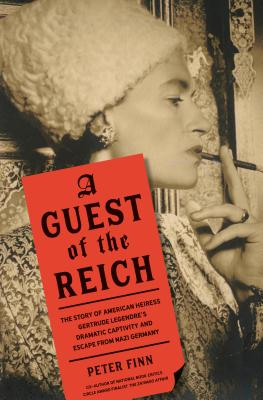A Guest of the Reich: The Story of American Heiress Gertrude Legendere's Dramatic Captivity and Escape from Nazi Germany by Peter Finn
Gertrude "Gertie" Legendre was a big-game hunter and from a wealthy industrial family who lived a charmed life in Jazz Age America. Her adventurous spirit made her the inspiration for a Broadway play, Holiday, which became a film starring Katharine Hepburn. When the Japanese attacked Pearl Harbor, Legendre, by then married and a mother of two, joined the OSS, the wartime spy organization that preceded the CIA. First in Washington and then in London, some of the most closely-held United States government secrets passed through her hands. In A Guest of the Reich, Peter Finn tells the gripping story of how in 1944, while on leave in liberated Paris, Legendre was captured by the Germans after accidentally crossing the front lines.
Subjected to repeated interrogations, including by the Gestapo, Legendre entered a daring game of lies with her captors. The Nazis treated her as a "special prisoner" of the SS and moved her from city to city throughout Germany, where she witnessed the collapse of Hitler's Reich as no other American did. After six months in captivity, Legendre escaped into Switzerland.
A Guest of the Reich is a propulsive account of a little-known chapter in the history of World War II, as well as a fascinating portrait of an extraordinary woman.
Review: Born Gertrude Sandford in 1902 in Aiken, South Carolina, Gertie was raised in a world of fabulous wealth. Her father inherited "an estate estimated at $40 million - close to $1 billion in today's dollars" (26). Her family had numerous homes and travelled extensively, and her family were closely connected with many famous and well-known individuals. In fact, Gertie was apparently "the inspiration for the character Katharine Hepburn played in the movie Holiday, based on the 1928 Broadway play by Gertie's friend Philip Barry" (6). Rather than being content with staying at home, Gertie was thrilled by exotic hunting trips. After an African trip that resulted in countless animals slain at her hand, she went again, this time on behalf of the American Museum of Natural History, in pursuit of animals to be staged "among a series of planned dioramas in the new Hall of African Mammals" in the museum (25). In 1929, Gertie married Sidney Legendere, to whom she was very devoted. The two purchased a plantation outside of Charleston and had two daughters - who received almost none of their time or attention.
When World War II broke out, Sidney ended up stationed in Hawaii. Gertie was not content to stay at home with her children and signed on with the Office of Strategic Services (OSS), the intelligence agency at the time. While serving abroad with the OSS, along with some companions, Gertie decided to take a little scenic drive that ended up in Nazi occupied territory. After two in the party were shot and wounded, they had to surrender to the Nazis. "Gertrude Legendre had just become the first American woman in uniform captured by the Nazis" (22). Such a foolish way to get captured. She was shuffled around and held in different cities until she finally escaped to Switzerland on foot. She was considered a prominent prisoner of war so was relatively well treated and still ate relatively well, given the wartime deprivations and also considering the horrible death camps that others were sent to.
Gertie was not a particularly likable person. She was extremely privileged and sort of callous about people as well. Her recount of her mother's death seems very unfeeling. And she certainly didn't seem particularly attached or caring to either of her children. She didn't seem bothered by the suffering during the Great Depression since she wasn't personally impacted by it. She was also racist and classist in her thinking: "For all her swashbuckling, Gertie was in some of her attitudes a creature of her country and class - casual with her prejudice in her private correspondence, comfortable in a segregated America where Jews, blacks, and other outsiders knew who sat, and who didn't, at the head table" (49).
I thought this was well written and explored an interesting if very hard to like character from history. I do wish the book had a been a bit more comprehensive. I would have loved more details on her family's background and wealth, her husband's family, and her life after the war. But the author did choose to mostly focus on her war exploits, which I understand. An unusual World War II biography that I enjoyed.
Stars: 4



Comments
Post a Comment